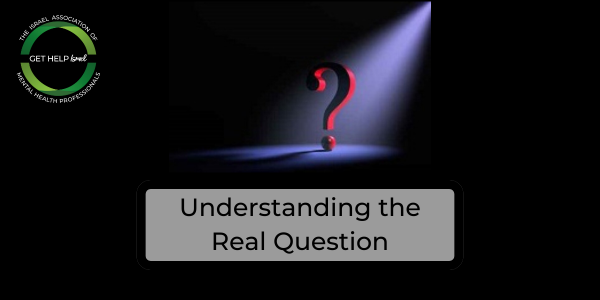Beyond Their Words: Understanding the Real Question

“The most important thing in communication is hearing what isn't said."
― Peter Drucker
It’s shortly before Passover, and a widowed woman approaches the town’s esteemed Rabbi with a question. She proceeds to ask if she can fulfill her obligation of daled kosos (the four cups of wine at the Passover Seder) by drinking milk instead. Without a moment's hesitation, the Rabbi provides her with enough money to purchase not only wine but also money to buy meat for the upcoming holiday. His reasoning is quite simple: if she is asking about using milk, it means she is lacking meat as well as wine.
When I first heard this story as a seventh-grade student, its impact was minimal. "What's the big deal?" I thought. "It doesn’t take a genius to figure out she's in need, since we know one doesn’t eat milk and meat in the same meal." So why does this story, seemingly so straightforward, get repeated by so many different educators and clergymen? As I matured, I began to grasp deeper lessons of sensitivity embedded within the story. The Rabbi could have merely answered her question about milk, but instead, he went beyond the literal words to address her underlying plight. Years later, I realized the story held an even more profound lesson: it’s not just about sensitivity, but about a crucial skill in communication—the ability to discern "what is the other person really trying to say?"
Deciphering a Hidden Message
Using the widow's story as our guide, her spoken words were, "Can I use milk for daled kosos?" But what she was truly communicating was, "Rabbi, I am in desperate financial straits. I have no wine, no meat, and I am too embarrassed to ask for direct help." The Rabbi in this story was able to read between the lines to respond to the widow’s actual need, not just her words.
This phenomenon of unspoken messages is far more common than we might realize, appearing in various painful scenarios. Two examples stand out in their heartbreaking frequency. There are numerous accounts of domestic abuse victims who claimed that when speaking with their clergy about issues within their marriage, had been advised to simply "be more happy," "more positive," or "more upbeat." The agonizing truth, however, was that they hadn't explicitly stated they were victims of abuse. They couldn’t bring themselves to utter those terrifying words. Instead, they might have said, "My spouse is always so angry", in the hope that the other party would be able to decode the message. The clergy, failing to both decipher or investigate further, responded to the perceived question about anger, missing the desperate plea for help in a domestic violence situation. Consequences of such an oversight can be devastating.
Another powerful example comes from my own experience. When I was sixteen, a friend publicly asked a Rabbi, "Is suicide muttar (permissible by Jewish law)?" As a teenager, I instinctively knew the answer: suicide is strictly forbidden. We all did. So why was this boy asking such an obvious question, seemingly wasting everyone’s time? But that wasn't his real question. His inquiry wasn't about the halakha (Jewish law); it was a desperate cry for help. He was having tremendous difficulties in his life and was contemplating suicide, This boy used this indirect question to signal his profound despair and his suicidal ideation.
The Art of the Deeper Question
Consider the following hypothetical case: Your twelve-year-old child typically takes the school bus home. One day, they ask if they can walk instead. What's your immediate reaction? Do you launch into a lecture about the distance they’re asking to walk, the dangers of walking home, or why the bus is the safest option? Or do you pause and ask why they no longer want to take the bus? Is your child experiencing an issue on the bus? Perhaps while on the bus they’re a victim of bullying, abuse? Perhaps it is simply social discomfort that is causing them to find alternative ways to get to and from school? If your first response is to shut down their proposed solution, they are far less likely to confide in you. Instead, engage with them. Ask, listen, and learn about their experiences. The true question might be veiled, but it’s waiting to be uncovered.
The skill of understanding what's truly being asked is not reserved for Rabbis, clergy, or parents dealing with weighty issues. It applies to every interaction, from professional settings to personal relationships. One should try their utmost to resist the urge to assume they fully grasp the intent behind every question. Don't be afraid to ask "What makes you ask that?" or "Can you tell me more about what's prompting this question?" Don’t be afraid to ask for more information about the bus ride, or for an explanation as to what the person means when they say “someone is angry all the time”. Children and adults alike often struggle to articulate difficult truths directly. Issues of abuse—physical, sexual, or emotional—are particularly challenging for many to discuss explicitly.
Taking the extra minute or two to genuinely understand the underlying question can make all the difference. You might be poised to give a perfectly correct answer, but if you've misunderstood the question, your "correct" response will be utterly unhelpful, and potentially harmful. The true magic lies not just in knowing the answer, but in truly understanding the question, especially the one that remains unsaid. It’s about listening with your ears, your mind, and your heart, to hear the silent whispers that carry the most crucial messages.



